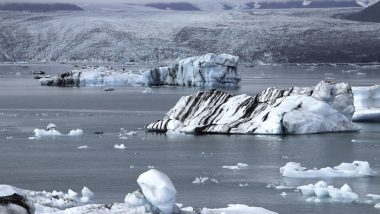New Delhi/Glasgow, October 31: Greenhouse gas (GHG) concentrations have reached new highs, the increase has continued in 2021 too, the past seven years are on track to be the seven warmest on record, and the global sea level rise accelerated since 2013 to a new high in 2021, the 'State of Climate in 2021' report said on day one of the COP26 on Sunday.
The levels of carbon dioxide (CO2) at 413.2 parts per million (ppm), methane (CH4) at 1,889 parts per billion (ppb)) and nitrous oxide (N2O) at 333.2 ppb, respectively have increased 149 per cent, 262 per cent and 123 per cent of pre-industrial (1750) levels, the 'State of the Climate in 2021' report by the World Meteorological Organisation (WMO) released at the start of the UN Climate Change negotiations, COP26, in Glasgow. COP26: India Launches Online Dashboard ‘Climate Equity Monitor’ on First Day of UN Climate Change Conference 2021.
Starting Sunday for next two weeks, at Glasgow, world leaders and negotiators would be discussing the dire circumstances that anthropogenic activities that have led the globe to a catastrophe and work out modalities to enhance efforts to reduce emissions to restrict global temperature rise to 1.5 degrees Celsius compared to the pre-industrial era.
"The global mean temperature for 2021 (based on data from January to September) was about 1.09 degrees Celsius above the 1850-1900 average," the report said.
The past seven years are on track to be the seven warmest on record, according to the provisional WMO State of the Global Climate 2021 report, based on data for the first nine months of 2021. A temporary cooling 'La Nina' event early in the year means that 2021 is expected to be "only" the fifth to seventh warmest year on record. "But this does not negate or reverse the long-term trend of rising temperatures," the report said.
"Record atmospheric greenhouse gas concentrations and associated accumulated heat have propelled the planet into uncharted territory, with far-reaching repercussions for current and future generations," the WMO said in a release.
"The provisional WMO State of the Global Climate 2021 report draws from the latest scientific evidence to show how our planet is changing before our eyes. From the ocean depths to mountain tops, from melting glaciers to relentless extreme weather events, ecosystems and communities around the globe are being devastated. COP26 must be a turning point for people and the planet," said United Nations Secretary General Antonio Guterres.
"Scientists are clear on the facts. Now leaders need to be just as clear in their actions. The door is open; the solutions are there. COP26 must be a turning point. We must act now a" with ambition and solidarity - to safeguard our future and save humanity," Guterres said in a video statement.
"Extreme events are the new norm," WMO Secretary General Professor Petteri Taalas said, adding: "There is mounting scientific evidence that some of these bear the footprint of human-induced climate change."
"At the current rate of increase in greenhouse gas concentrations, we will see a temperature increase by the end of this century far in excess of the Paris Agreement targets of 1.5 to 2 degrees Celsius above pre-industrial levels," Taalas said. "COP26 is a make-or-break opportunity to put us back on track."
The report combines input from multiple United Nations agencies, national meteorological and hydrological services and scientific experts. It highlights impacts on food security and population displacement, harming crucial ecosystems and undermining progress towards the Sustainable Development Goals.
(The above story first appeared on LatestLY on Oct 31, 2021 10:38 PM IST. For more news and updates on politics, world, sports, entertainment and lifestyle, log on to our website latestly.com).













 Quickly
Quickly


